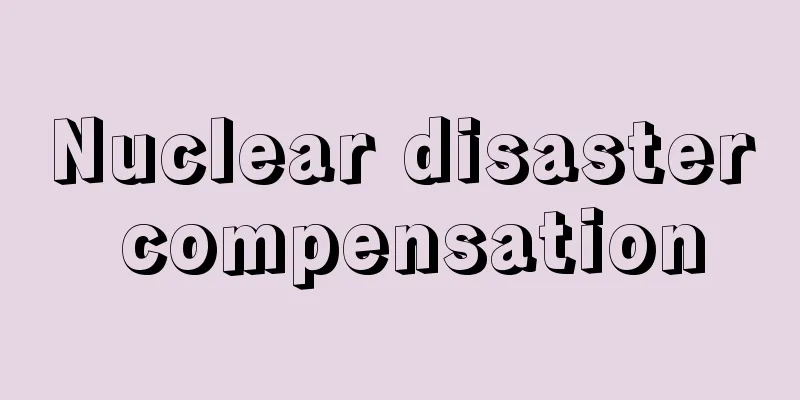Nuclear disaster compensation

|
This is the compensation paid when nuclear damage occurs as a result of the operation of a nuclear reactor, and is legally called nuclear damage compensation. When nuclear damage occurs as a result of the operation of a nuclear reactor, the general principle of tort based on the principle of negligence (Article 709 of the Civil Code) poses great difficulties in providing relief to victims, as victims cannot obtain compensation unless they prove the negligence of the nuclear operator. Therefore, the Law on Compensation for Nuclear Damage (Law No. 147 of 1961, abbreviated as the Nuclear Damage Compensation Law or the Nuclear Damage Compensation Law) based on the principle of no-fault liability was enacted. According to this law, when nuclear damage is caused by the operation of a nuclear reactor, the nuclear operator involved in the operation of the reactor is liable to compensate for the damage (regardless of whether or not there was negligence) (Article 3, paragraph 1, main text), but is only exempt from liability if the damage is caused by an abnormally large natural disaster or social unrest (proviso to the same paragraph). Here, "operation of a nuclear reactor, etc." refers to the operation of a nuclear reactor, processing, reprocessing, use of nuclear fuel material, and the associated transportation, storage, or disposal of nuclear fuel material or material contaminated by it, as specified by government ordinance (Article 2, Paragraph 1). "Nuclear damage" refers to damage caused by the action of the process of atomic fission of nuclear fuel material, or the action of radiation or toxicity of nuclear fuel material or material contaminated by it (Article 2, Paragraph 2). In order to simplify and clarify the payment of compensation, the Nuclear Damage Compensation Act also concentrates the liability under the Nuclear Damage Compensation Act on the nuclear operator alone, and other persons are not liable for compensation (concentration of liability; Article 4, Paragraph 1). However, if the damage is caused by the willful act of a third party, the nuclear operator who compensated for the damage may seek compensation from that person (Article 5). In order to ensure the fulfillment of the above-mentioned liability for damages, the Nuclear Compensation Act established a system called damage compensation measures. In other words, nuclear operators are not permitted to operate nuclear reactors unless they have nuclear liability insurance contracts and nuclear damage compensation contracts or deposits approved by the Minister of Education, Culture, Sports, Science and Technology (former Director-General of the Science and Technology Agency) as being able to allocate 120 billion yen per factory, business establishment, or nuclear ship to compensation for nuclear damages (or equivalent measures approved by the Minister of Education, Culture, Sports, Science and Technology) (Articles 6 and 7). In addition, the state is to provide nuclear operators with the necessary assistance to compensate for damages in some cases (Article 16). [Takahisa Awaji] [Reference item] | |Source: Shogakukan Encyclopedia Nipponica About Encyclopedia Nipponica Information | Legend |
|
原子炉の運転等により原子力損害が生じた場合に支払われる補償のことで、法律的には原子力損害賠償とよばれる。原子炉の運転等によって原子力損害が生じた場合に、過失責任主義に基づく不法行為の一般原則(民法709条)によると、被害者は原子力事業者の過失を立証しなければ損害賠償を得ることができないなど、被害者救済上大きな困難がある。そこで、無過失責任主義に基づく「原子力損害の賠償に関する法律」(昭和36年法律147号。原子力損害賠償法とか原賠法とか略称する)が制定された。同法によると、原子炉の運転等によって原子力損害を与えたときには、当該原子炉の運転等に係る原子力事業者が(過失の有無を問わずに)その損害を賠償する責任を負い(3条1項本文)、ただ、その損害が異常に巨大な天災地変または社会的動乱によって生じたときにのみ免責される(同項但書)。ここで、「原子炉の運転等」とは、原子炉の運転、加工、再処理、核燃料物質の使用、およびこれらに付随して行われる核燃料物質またはそれによって汚染された物の運搬、貯蔵または廃棄であって、政令で定めるものをいう(2条1項)。また、「原子力損害」とは、核燃料物質の原子核分裂の過程の作用または核燃料物質もしくはそれによって汚染された物の放射線の作用もしくは毒性的作用により生じた損害をいう(2条2項)。原賠法はまた、損害賠償の支払いを単純化、明確化するために、原子力事業者だけに原賠法上の責任を集中させ、その他の者は損害賠償責任を負わないものとした(責任の集中。4条1項)。ただし、その損害が第三者の故意によって生じたものであるときには、損害を賠償した原子力事業者はその者に対して求償することができる(5条)。 以上のような損害賠償責任の履行を確保するために、原賠法は損害賠償措置とよばれる制度をとった。すなわち、原子力事業者は、原子力損害賠償責任保険契約および原子力損害賠償補償契約もしくは供託であって、1工場、1事業所あるいは1原子力船当り1200億円を原子力損害の賠償にあてることができるものとして文部科学大臣(旧科学技術庁長官)の承認を受けたもの(またはこれらに相当する措置であって文部科学大臣の承認を受けたもの)を講じていなければ、原子炉の運転等をしてはならないものとされている(6条、7条)。また、国も場合によっては、原子力事業者に対し、原子力事業者が損害を賠償するために必要な援助を行うものとしている(16条)。 [淡路剛久] [参照項目] | |出典 小学館 日本大百科全書(ニッポニカ)日本大百科全書(ニッポニカ)について 情報 | 凡例 |
Recommend
Environment Agency - Environment Agency
The Environment Agency is a national environmental...
Gesellschaft
…It is translated as a community or a basic socie...
Asagara - Asagara
A deciduous tall tree of the Styrax family that gr...
Mosan
A town in North Hamgyong Province, North Korea, k...
PCP - pentachlorophenol
Molecular formula: C 6 Cl 5 OH. White crystals, me...
Hypochoeris ciliata (English spelling) Hypochoerisciliata
… [Morita Tatsuyoshi]. … *Some of the terminology...
Keith-Flack knot
…The sinoatrial node determines the overall rhyth...
Crab Croda - Crab Croda
...Its Sanskrit name is Kani-Krodha, and it is sa...
Kose school
A family of painters that continued from the earl...
Respect for the Emperor - Sonnoron
Based on the idea of the Divine Nation of Heaven...
Meumann, E.
...In Herbart's time, psychology as a modern ...
Genji firefly (English name) Luciola cruciata
Coleoptera, Lampyridae. With a body length of 12-1...
Amdo dialect - Amdo dialect
...the language of the Tibetan people living in t...
QuickTime
A multimedia technology developed by Apple Inc. i...
Marine Energy - Kaiyo Energy
A general term for the mechanical and thermal ener...









